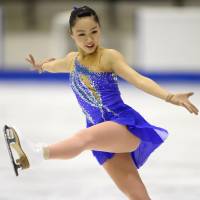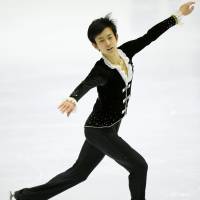It was another week of great success for Japan at the recent world junior championships in Tallinn, Estonia. The Hinomaru came away with three of the six singles medals on offer thanks to Shoma Uno (gold), Sota Yamamoto (bronze) and Wakaba Higuchi (bronze).
Uno became the fifth Japanese man to win the world junior title after Daisuke Takahashi (2002), Nobunari Oda (2005), Takahiko Kozuka (2006) and Yuzuru Hanyu (2010).
Uno's victory was reminiscent of Hanyu's in Sochi. Both built up leads with superb short programs and then held on despite miscues in their free skates. Uno impressed observers despite not landing a quad.
In an interview after his free skate Uno was asked who his idol was.
"(Daisuke) Takahashi — He has wonderful expression," Uno replied.
While Uno deservedly received the most attention, Yamamoto impressed with a sublime free skate that moved him from seventh place onto the podium. Yamamoto turned 15 just two months ago and possesses great potential for the future.
Yamamoto, who hails from Kishiwada, Osaka Prefecture, reminds Ice Time of a younger Hanyu. He has a similar build to the Olympic champion and displays a feathery touch when landing his jumps. It will be interesting to watch his progression in the coming years.
The bronze medal capped off a stellar season for Yamamoto, who made the podium at five of the six events he entered. The only exception was the Japan's senior nationals, where he finished sixth.
Yamamoto is coached by Hiroshi Nagakubo, best known for his long association with Akiko Suzuki. Yamamoto was the silver medalist at the Junior Grand Prix Final this season after placing second at the JGPs in Estonia and France.
"He has grown and developed his jumping skills recently but doesn't have artistic skills yet," commented an international judge about Yamamoto. "He needs to improve more. He is still young, so I am looking forward to it."
The judge admitted that Yamamoto's third-place finish at the world juniors was a surprise.
"I actually didn't think Sota would be on the podium. That's really great work," the judge said.
Higuchi, who had her 14th birthday in January, held her own against Russia's Evgenia Medvedeva and Serafima Sakhanovich as she, Kaori Sakamoto and Yuka Nagai combined to give Japan three of the top seven places in the women's event.
"Wakaba is a wonderful skater. I'm looking forward to her (presence) at the next Olympics," said the judge. "She has great skating skills and the flow of the edge like Patrick Chan."
High praise indeed for the Tokyo native who is expected to be one of Japan's hopes at the 2018 Pyeongchang Games.
Stinging rebuke: It has been more than a year now since the travesty at the Sochi Olympics that deprived Yuna Kim of a second gold medal. It's nice to know that Ice Time has company with this sentiment.
At last month's Four Continents Championships in Seoul, the South Korean fans let the International Skating Union know what they thought of the sham in Sochi. Several signs were displayed during the women's event that no doubt made the ISU uncomfortable.
Here are some examples:
"ISU thief"
"The robbers of Sochi"
"ISU out"
"ISU needs reform"
"Sochi is not over"
"Sochi, home cooking"
"The truth does not change"
"Who was the champion in Sochi?"
"Return Yuna's gold"
I have a great deal of respect for the fans of Yuna who continue to carry the torch for the injustice she was subjected to. I can still remember sitting in the Media Center in Sochi the day after the women's free skate, which saw Russia's Adelina Sotnikova end up with the gold, and thinking, "What a complete disgrace."
Book report: Ice Time is currently reading an insightful biography of 1976 Olympic gold medalist John Curry of Great Britain. "Alone: The Triumph and Tragedy of John Curry" is a fantastic look at the man who changed men's skating with his artistic impression.
Curry, who was 10th at the 1972 Sapporo Games, won it all four years later on a magical night in Innsbruck, Austria, under the tutelage of legendary Italian coach Carlo Fassi. In the span of an incredible 50 days, Curry became the European, Olympic and world champion.
I mentioned the book to a British friend of mine recently and he recalled how "the entire nation rallied around Curry." He was the first of two British men — along with Robin Cousins in 1980 — to win the Olympic gold.
Though Curry enjoyed incredible glory in his career, he led a tortured life and died of AIDS in 1994 at the age of 44. Author Bill Jones covers it all in detail in this highly recommended work.




















With your current subscription plan you can comment on stories. However, before writing your first comment, please create a display name in the Profile section of your subscriber account page.